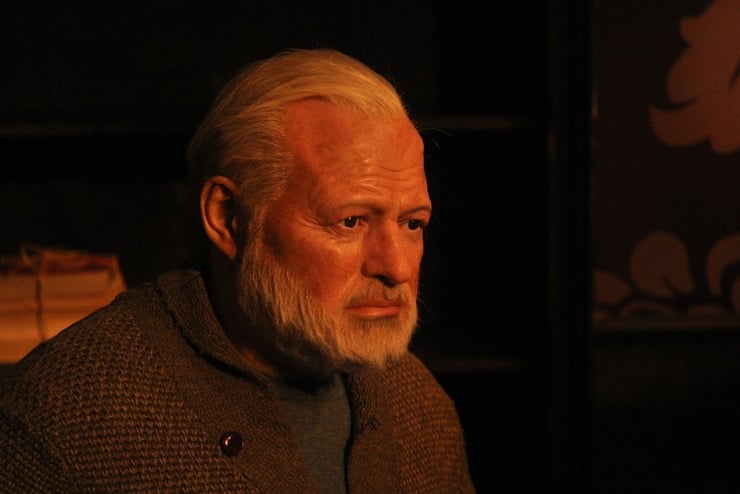General Robert E. Lee, Charles Lindbergh, and Ernest Hemingway were among the names of great Americans I listed in a London Spectator article quite a long time ago. Needless to say, if one were to mention these names today in an American publication or news program, all hell would break loose, and the name-dropper would instantly become a nonperson.
The left-dominated, nihilist academic establishment and pop culture of today, supported by the laughable “mainstream media,” have turned this once-great nation into a collection of identity politics and grievances. Common sense has been replaced by crazed theories about subconscious prejudices, and promoting social justice is the frenzied order of the day.
Hence I was pleasantly surprised when PBS announced that it was showing a six-hour documentary by Ken Burns and Lynn Novick on Ernest “Papa” Hemingway, an event that the degenerate New York Times predictably called “subversive.” Burns and Novick have done in-depth series on baseball and Vietnam, not to mention the Civil War, so I wasn’t worried even after the decadent paper-of-record asked, “Why Hemingway now?” When masculinity, patriotism, courage, and beautiful, graceful writing are all under attack by the effete, nerdy, asexual freaks who pose as cultural gatekeepers at The Times, I say,“Why not Hemingway now?”
Hemingway was to spartan American prose what he claimed Mark Twain was to the American novel: its father. Not even today’s degenerates can deny that he invented the clean, lucid prose style of modern fiction, which he accompanied with the virile swagger of his personality. His macho bluster is scorned in today’s feminized world, but he was as brave as they come, having been seriously wounded at age 18 and under fire time and again in both world wars and during the Spanish Civil War.
I first spotted Papa swaggering down Fifth Avenue when I was home from boarding school during the 1954 holidays. I followed him, and to my delight he entered El Borracho, a restaurant off of Fifth where my parents used to take me regularly. It was nearly empty, and he sat at the bar. I approached, introduced myself as a great fan of his, named my prep school, and he offered me drinks. I had three whiskey sours and got completely soused. The barman hadn’t dared deny him despite me being underage.
We discussed The Snows of Kilimanjaro and The Sun Also Rises. Then he suddenly asked for the bill, tapped me on the shoulder, and was gone. I walked up Fifth toward home, and I remember my mother’s shock at finding me drunk at three in the afternoon. She was no fan of America, its familiarities, and its manners. The next day I went to Dunhill Tailors and ordered a brown tweed suit just like the one Papa was wearing. (It was very itchy.) Three days later it was all over. The New York Post exposed my new best friend as a total phony. The real Papa was in Venice. To say I was crestfallen would be a gross understatement.
The new Burns documentary has no gauzy, nostalgic patina tinting the text. But it deftly convinces the viewer how literature was, and still is, shaped by Hemingway’s ideas of clarity and brevity. He stripped away the florid style employed by Henry James and Edith Wharton, and instilled his macho manliness into the power of his pen. The drumbeat rhythms and lyric beauty of his writing style turned millions of readers into little Hemingways, copying him in writing and in conversation. It established the enduring myth of the man.
Reading the “Polemics & Exchanges” section of last month’s Chronicles, I noticed the objections of certain readers over true versus false conservatism, and the editors’ response. Papa was no conservative in its present form, but manliness, truth, courage, grace in the face of danger, patriotism, and love of country are conservative traits, and he had them all. Reevaluating icons is now the order of the day, and Papa Hemingway is everything the left hates and fears. In my book, that alone makes him a great conservative, at least in spirit. Like Norman Mailer, Irwin Shaw, and James Jones, Papa had seen action in war, and that separates him from the effete creatures who now pass as writers. He was brainy, yet brawny—a far cry from, say, Proust.
The publisher Charles Scribner III compared F. Scott Fitzgerald with Strauss, and Hemingway, by contrast, with Stravinsky. His stark, staccato prose, its tonality, was modernity itself. I remember reading of his death in 1961 while sitting in my aunt’s Athenian garden. Never have I wanted anything more than to become a writer like him, an unfulfilled wish by a mile, but one that shaped my life. Papa chased beautiful women and drank like a Karamazov, but never flinched in the face of danger and took his lumps uncomplaining. Head traumas after numerous accidents did him in.
I couldn’t watch the end of the documentary, but I did. I hope the present lot at The Times did, too, and stayed safe and warm in their nappies.
Image Credit:
above: Ernest Hemingway’s likeness in a wax figure (Antonio Salgueiro/Pixabay)

Leave a Reply